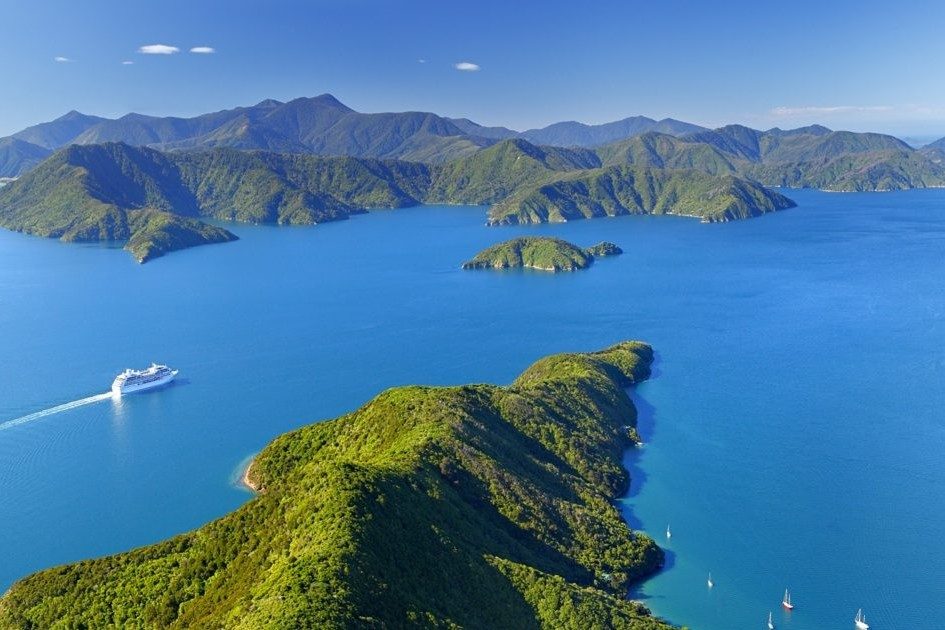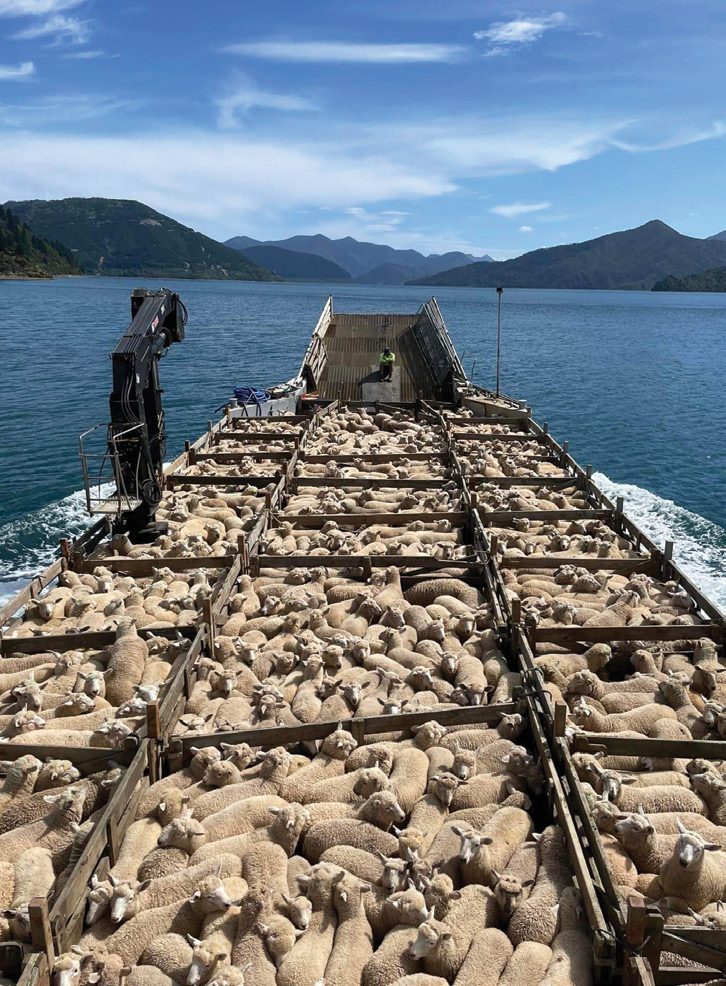Farming without a road
Farmers in parts of the Marlborough Sounds have been cut off from truck access for months and now rely on service by sea. Joanna Grigg reports.

Farmers in parts of the Marlborough Sounds have been cut off from truck access for months and now rely on service by sea. Joanna Grigg reports.
Farms in the Marlborough sounds carry about 35,000 stock units, with six large farm businesses carrying a fair chunk.
Emma Hopkinson and her husband ‘Hoppy’ run 6000 stock units over three farms: the home farm at Kenepuru, a 20-year lease block at Titirangi and a smaller lease block at Waitaria Bay. She wants those making roading decisions to know these farms are productive and earn export dollars for New Zealand.
“Without truck access, our business is hugely affected,” Emma says.
Road access to Kenepuru was affected by a storm in July 2021, then another storm in August 2022, which produced twice the damage. Nearly 700km of roading network within the Sounds was damaged, with 4000 faults. Only light vehicles (less than 3.5 tonnes) are allowed through and nothing longer than eight metres.
Emma is hugely concerned that this productive part of NZ farmland is going to decline under financial pressure, brought about by restricted road access and the resulting costs to use sea access.
Emma wants people to know how damaged roads between farms and their processing plants, the fertiliser plant and the contractors are affecting the sheep and beef businesses.
She’s not looking for pity. She’s a voice for small businesses on the cusp.

Like parts of Gisborne, Banks Peninsula and Northland, Marlborough is at risk of permanent changes to access. The cost/benefit analysis is pointing towards maintaining roading infrastructure for truck and trailer units as being financially unsupportable. Will the retiring of linkages to rural areas be something NZ will see more of?
Emma just wants to know if or when the road might be restored. She doesn’t want the Government to walk away from fixing the damaged roads, but she understands the costs.
“I’d like to see the road back for truck and trailers – a gravel road is fine.”
It is not just for the farmers.
“There are 35 baches here that need rebuilding – they need concrete trucks in here.”
From the outside, the Sounds look idyllic with sheltered bays, green slopes, clear water and bush backdrop. The reality is that a storm in July 2021 cut truck and trailer access and it was not restored before another storm turned the road into a mass of slips. Now mostly down to one-lane, the road only allows short-length resident vehicles through (ute and trailer).
Sounds farmers are rallying to the challenge. After the 2022 storm, Emma went to Christchurch to meet with their meat processor livestock general manager Murray Behrent from the Alliance Group to negotiate on behalf of the Marlborough Sounds farmers.
“Everyone in Marlborough Sounds supplies Alliance apart from one, and it makes sense to pool together to get stock to Nelson or Levin.
“They arranged to subsidise our transport costs if we all work together on loads.”
The Hopkinsons have had to change their business model away from lucrative lamb finishing.
“We used to bring 2000 lambs in and out by road, which is about four-unit loads.”
They also used to graze hoggets off for winter but can’t make it pay now. Transporting stock involves an empty truck being barged from the port at Havelock to Fish Bay. This takes two-and-a-half hours one way.
While the farmers are grateful to the barging service, the way it works means farmers don’t often have a confirmed price for a trip.
“It’s subsidised 50% at the moment but it’s a big cost for us still,” Emma says.
Logistics is complicated. Truck drivers need considerable skill to back on to a barge with a trailer as barges are not double ended.
The Hopkinsons’ yards have become like the local sale yards, with other farms’ stock arriving there prior to loading.
“That in itself is about two hours from some farms, so they have to overnight here, and feeding can be an issue, so we’ve worked with MPI on that.”
Emma says farmers are happy to plan ahead to make up a load, but sea transport is so fickle and often it takes many attempts to get a barge on site. The local farmers all bought in sire bulls at the same time.
“When the 2021 floods hit, we held on, hoping the truck and trailer access will reopen, but it never did.”
The Hopkinson’s have barged in 58 tonnes of fertiliser, but it’s a far cry from the 400t they used to apply. Emma is concerned about eroding soil fertility.
“We’ve switched to pellets so can add things to it.”
She says they fly fertiliser 16km to the Titirangi block from the Kenepuru farm strip. This is a 12-minute trip each load.
The Hopkinsons have Sufftex and Suffolk Studs (under Marley Farms), relying on the higher value a head returns.
“Hoppy went out with the ute and trailer and 20 rams on the barge this year, as face-to-face contact with buyers is important.”
Wool is backloaded with supplies. Emma says the Leslie Brothers contractors have been fantastic as they are happy to bring in gear to drill and make balage.
The other two valued contractors are Gareth Parkes and Brian Palmer.
“These three main contractors are very loyal to us, but how long will they put up with salt spray on their gear?”
It takes two hours to clean it, Emma says, and four hours longer travel time than if they could drive in.
“We are testing their loyalty.”
Emma queries why they are still paying rates to the council when they don’t have a road.
“We pay $20,000 for what?
“I don’t want to be angry, but do feel that way at times.”
A field day to showcase sheep and beef farming in the Sounds is planned for late March. A boat trip into the Moletas at Waitui and Hopkinsons at Keneperu is being organised by Sounds farmers, with support from Beef + Lamb NZ and Marlborough Federated Farmers.
Freight costs double
Even with a subsidy on barge costs from the Marlborough District Council, getting goods in and out by sea is making waves for Sounds farmers.
Trucking contractor Gareth Parkes says one farmer had worked out it cost 200% more to cart fertiliser from Blenheim to Anakoha in the Sounds. The fertiliser truck had to go on a longer sea trip by barge, then carry on by road to the northern Sounds.
Gareth has transported stock in and out of the Sounds for several years. Following major flood damage to local roads in July 2021, he has had to bring his truck and trailer unit in by barge, costing between $6000 and $4000 a trip.
“And it takes me a whole day longer.”
He used to be able to drive into the Sounds at night, spend the day collecting stock, then drive out to the sale yards or plant. Now he barges in and spends the next day gathering stock from different farms, mobbing them up at yards near the barge site. He then has to load them all again and barge out. It takes two days but he gets paid for one.
Gareth credits stock agent Rod Mackenzie for his dedication to the Sounds farmers and keeping the cattle trade going. The former Alliance stock agent helped source homes for trading cattle and helped farmers work together to make full loads.
“With stock all going to Alliance it’s good, as they take sheep, deer and cattle, so I can make up a load with a mix of stock.”
Gareth says that if the road is not made suitable for truck and trailer units, the Government needs to pay 100% of the barge costs.
“Even subsidised it’s not going to be cost effective long term.
“Farmers feel like they are going backwards fast.”
He says Federated Farmers and Beef + Lamb NZ are running a study on the costs and possible options for farmers.
- See the video clip of Gareth Parkes barging his truck and trailer unit through Kenepuru Sound and around the Sounds roads. Head to: bit.ly/3WV3Yvf




